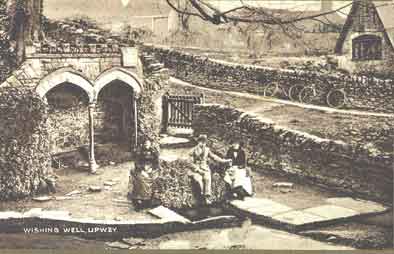
THE WISHING WELL

An old postcard postmarked 1924
From Highways and Byways of Dorset, Joseph Pennell, 1914
The village of Upwey-the
Upper Town on the Wey- affords an extraordinary instance of the value of a
happy, if meaningless, title. Upwey is'one of the places of pilgrimage for the
Weymouth holiday-makers. They come here in hundreds, mostly in coaches and
wagonettes. The reason for their coming to Upwey is a spring there with the
fascinating title of the " Wishing Well." It is to see the Wishing
Well that the romantically minded pay their shillings for a seat in the crowded
char-a-banc.
The well, as I remember it some forty years
ago, was a spot of faint interest; its powers were ill-defined, and there was no
particular ground for assuming that a wish expressed at Upwey would have
especial advantage. The place is pleasant enough, in spite of the crowd, the
swings, and the tea-gardens. A spring issues from the foot of a wooded bank,
and, hurrying away under an avenue of trees, vanishes at the mill. A seat placed
under two ridiculous stone arches has been erected for the benefit of the
tripper. For the benefit of the villager, on the other hand, the following
ritual has been introduced, which has proved to be more lucrative than a mere
gazing at the waters.
The wisher receives a glass
of water from the custodian of this Fons Bandusea, he drinks it with appropriate
giggling, empties the glass by throwing the water over his left shoulder, and,
most important of all, makes an offering of money to the keeper of the well.
Folk of all kind go through this formula for the attaining of supposed ends-old
men and maidens, young men and children. It is a curious spectacle for the
twentieth century, even if it serves no more than to illustrate the magic of a
pleasing name. The well is commonplace enough, but the name is charming. A like
discrepancy between an object and its title is afforded by the " Golden
Horn " at Constantinople, which is less picturesque than Wapping, and by
the " Isles of Greece," which are the most scraggy and featureless of
islands.
The village itself is very
prettily placed under the shelter of the downs, but is slowly taking on the
characteristics of a suburb. One of the earliest lords of Upwey was Ranulph de
Baieux. In the time of Henry III. John Baieux left two daughters as his sole
heirs. The King granted the marriage of one of them to Elias Rabayne, an eminent
man of the period, who under colour of that grant carried the other daughter
over the seas, so that he might seize the whole estate. The result did not come
up to the expectation of the crafty EIias, for his estates were forfeited to the
King as a punishment for his covetousness.
The old church of Upwey has
been restored without being spoiled. It is of the type common throughout Dorset.
A little of the ancient oak wainscotting remains, as well as a carved pulpit of
the time of Charles I. In the chancel are three figures of saints in mellow
wood, with which holy men are said to have decorated a still earlier pulpit.
Among the three St. Peter is conspicuous. In one hand he holds the keys, in the
other a book: He is clad in a furred cloak, which is coquettishly looped up SG
as to show his breeches, stockings, and
smart shoes.
From
a Ward Lock guide to Weymouth, published in 1938
Upwey, which lies in a prettily wooded valley. The road
passes by the old Manor House, dated 1659, and the remains of ail excellent
Tudor house, now called Bayard Dairy. The famous Wishing Well will be
found at the far end of the village, by the church.
The pleasant old custom of wishing while drinking the ice-cold water offered by the villagers is still followed with solemn ceremony by most visitors, although the two picturesque old ladies in sunbonnets who used to serve it have been dead for some years. The well is surrounded and completely shaded by trees, forming a delightful dell, in refreshing contrast to the main Dorchester road. Simple refreshments can be obtained near the well. Strawberry teas are in large demand in Upwey in the summer.